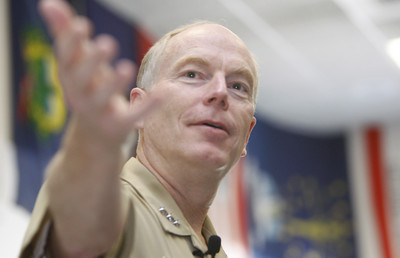Admiral: Scrap upper age limits to sign up
In Las Vegas Saturday to thank Navy reservists for their service, Vice Adm. John G. Cotton said mandatory upper age limits for military enlistment should be discarded in favor of a case-by-case system largely dependent on an individual's physical condition.
That kind of thinking by military brass is fueled by the fact, Cotton said, "that 72 percent of our nation's youth are ineligible for military service."
Drug use, criminal records, and a lack of education disqualify "a disturbing number of young people," Cotton said in an interview following a talk at the Navy Operational Support Center at Nellis Air Force Base.
If people will finally recognize how dire the situation is among the nation's youth, then "a solution can be found," he said.
Cotton also said that two-thirds of college graduates are now women, meaning far more of them could enter the country's military officer corps. The Pentagon is studying how women in the military can go back and forth between active duty and reserve duty between pregnancies, he said.
Possible manpower shortages are of concern to military commanders, he said, with the spread of terrorism around the world.
Cotton noted that the Navy issued a waiver to a 62-year-old doctor who wanted to serve his country.
"If you have the skill set a service can use and are in good physical condition, age should not be a factor," the admiral said.
In 2006, Congress raised the maximum age for enlistment in the military to 42, from 35. But Department of Defense policy allows the individual services to specify a lower maximum age of enlistment based on their own requirements.
For instance, the active Army and Army Reserves allow 42-year-olds without prior military service to enlist, yet the Navy has set a maximum age of 34 for active Navy and 39 for its reserves.
The time has come, Cotton said, to allow people in good health and with solid skills to sign, say, a contract of service for three years.
Conventional thinking has always been to consider that the age of enlistment should allow 20 years of service and a military retirement.
"If people want to give back to their country at a later age, they should be allowed to," he said.
Cotton, an American Airlines pilot who graduated from the U.S. Naval Academy in 1973, took a leave of absence from the airline in 2003 after the U.S. Senate confirmed him as chief of the Navy Reserve and commander of the Navy Reserve Force.
Though he doesn't favor a military draft, Cotton did say he favors compulsory national service.
While some people might choose to work with the disadvantaged or on environmental projects, others might favor the military, which now numbers about 1.3 million on active duty and 1.1 million reservists.
Cotton said it is possible that civilians could take over more jobs on military bases, easing recruiting challenges.
"You don't always have to have someone in uniform doing a job on a military base," he said, "but you also have to remember that when overtime is required, a person in uniform doesn't get extra pay. There are pluses and minuses."
Cotton said that the ground war in the Middle East means the Pentagon will increase the number of Marines and soldiers in the Army while slightly cutting Navy and Air Force personnel.
He said, however, that about 50,000 new Navy personnel are needed each year due to turnover.
Contact reporter Paul Harasim at pharasim @reviewjournal.com or (702) 387-2908.

















